Why we play games: Player types and psychology
- January 7, 2022
- Michał Dębek
Saying that someone is a gamer is – in the light of today’s knowledge about psychology and the gaming market – much like saying that they like music or movies. In other words, such a statement says nothing about the person. According to various estimates, there are about three billion players in the world today. It’s a large but incredibly diverse group of individuals. Even though they all share a “passion for gaming”, it’s a completely different experience for each of them – while one person is into Bejeweled on their smartphone, another one prefers to play Dark Souls on a tuned gaming PC. Both types of people are referred to as players, but intuition suggests they may, in fact, have very little in common. Players can be segmented and categorized in many ways, and they often are.
For example, player groups can be divided by preferred platform, genres, gaming behavior, gaming spending, gender, age and other characteristics. Or due to the various motivations that guide their behaviors and choices. By using such divisions, game developers and publishers can map the complex patterns of behavior and gaming preferences of specific groups of players. This in turn allows them to design better games and promotional activities. As a result, they can produce the right games to meet the needs of specific audiences.
In this article I present one of the possible divisions of players due to motivation, and discuss the typology of players proposed by the often quoted gamification consultant, Andrzej Marczewski. It is an interesting and universal concept worth in-depth research. We also use it in our current, international research on players, the Polish part of which I will also be referenced in this text.
Why do players play games?
To answer this fundamental question, you need to understand what motivates people to act in general, not just in games. This subject has been broadly explored in countless publications by motivational psychologists. For the purpose of this article, it is important to understand that, at the most general level, the motives of human behavior fall into two groups:
- extrinsic (when players play games for specific rewards such as ranking up, unlocking various badges and achievements, and gaining various other benefits such as in-game currency). This could also include profits from the sale of in-game items, skins, or other content, e.g. NFT-verified collectibles.
- intrinsic (in the case of players, it is mainly curiosity, striving to follow the story and see the events unfold, developing their competences and becoming better).
While external themes are rather obvious and very easy to use, also in gamedev, internal themes are a challenge. Marczewski, based on the psychological theory of self-determination theory (SDT) by Edward Deci and Richard Ryan, systematized them as follows:
- relatedness, i.e. being part of the social world, making acquaintances and sharing your activities with other people,
- autonomy, i.e. freedom or a sense of agency and freedom of choice,
- mastery, a very obvious drive to play. Developers take special care to make sure the game offers proper balance between the difficulty of challenges and the player’s skills,
- purpose, i.e. the feeling that what you do makes sense, leads to something good or significant; sometimes it is an altruistic goal (when we do something for others) and sometimes not (we want to feel that our actions matter, that we have a greater importance in the “fate of the world”, e.g. the world presented in the game),
- disruption, willingness to act for or against something, cause negative or positive changes or innovation in the environment.
These six forces (five intrinsic motivators and extrinsic motivators) drive people to play certain games in specific ways. When skillfully handled by developers, these motivators help to maintain the player’s desire to play, giving satisfaction and a sense of fulfillment.
When the player casually declares that they “play for fun” or to “relax”, it means that various combinations of the above-mentioned motivations are at play.
Good games implement these motivators efficiently (of course, not all of them at once). Bad games, on the other hand, fail to do that – which is one of the reasons why they usually disappear among thousands of other games failing to achieve market success.
Each of us, players, has a specific hierarchy of the above motivators. For some, the most important thing is relatedness, for others, autonomy, and for others, it’s purpose. For others, the most important thing is purpose, followed by mastery, while relatedness is completely irrelevant. Using the various combinations and hierarchies of internal and external motivators, Marczewski developed a framework including six player types – HEXAD. Each type of player plays primarily for one or two reasons, followed by others. There are no “pure types”. Each player is a mix of all the six types, but there are usually one or two dominant ones.
Disruptor
Disruptors are motivated by the desire for change. They are creative and don’t like to follow the beaten path – they value autonomy. They like to approach or extend the limits of what is possible. Disruptors are not necessarily the “bad ones”, as disruption naturally leads to innovation (so-called creative disruption). Moreover:
Also, disruptors are the ones who find a glitch in the game and then figure out how to use it to their advantage.
These types of players will appreciate:
- “out of the box”, unconventional and original, activities,
- a kind of voting mechanism allowing them to have a real impact on the game,
- modding opportunities, allowing them to redesign the game world,
- rules that can be changed,
- moments of anarchy and chaos, e.g. occasional themed events from time to time,
These game elements will keep the Disruptors satisfied. However, the research conducted by Gustavo Tondello from the Games Institute University of Waterloo (hereinafter referred to as UoW) showed that what makes disruptors happy is competition with other players (which the author of the HEXAD framework did not initially assume). Besides, they are satisfied with the tools for creative activity.
It is important that the more Disruptor traits a person has, the less the person cares about what others say about them (see GC). This explains why
Disruptors can thus be either socially dangerous or very creative and useful – they are free from embarrassing conventions or the tendency to “be normal”, which is common to other player types.
Personally, they are rather emotionally stable (non-neurotic), but can also have a mix of other personality traits. Our research into the relationship between player personality and gaming preferences shows that emotionally stable players enjoy FPS and sports games more than other players do. However, they do like simulators.
Among the Polish players surveyed by Try Evidence (a description of the players participating in our research can be found at the end of this article), people matching the Disruptor type preferred fighting, FPS, Survival Horror and Action games more than other players.
Below I present the genres which HIGH Disruptors, prefer significantly less or significantly more than players demonstrating low levels of such features (LOW Disruptors).
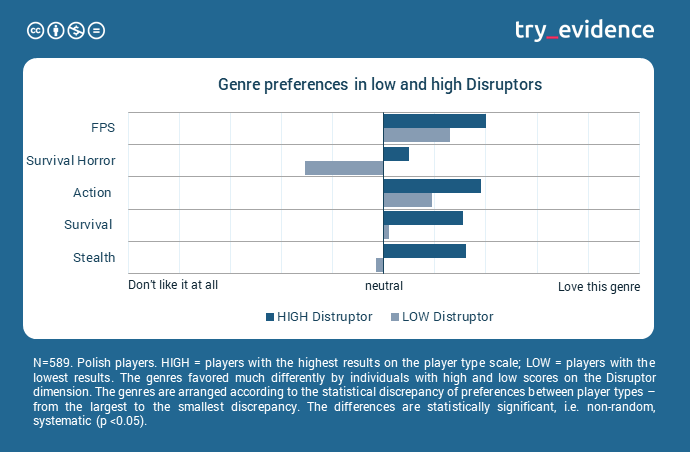
According to UoW research, the Disruptors are (moderately) “related” only to the Free Spirits – described below. According to our research, on Polish players (the description of the sample can be found at the end of the article), high scores on the Disruptor scale also correlated with high scores on the Achiever and Player scales.
Free Spirit
The Free Spirit is motivated by the pursuit of autonomy and a sense of agency. These players like to feel free and express themselves by customizing specific elements of the game (heroes, locations) and unlocking unique content. They love to explore and take part in non-linear quests.
A good easter egg will always bring a smile to their face.
The Free Spirits will appreciate:
- opportunities for unrestricted exploration,
- multiple branching plotlines,
- the presence of easter eggs,
- the presence of hard-to-acquire, rare epic content to discover
- the possibility of customizing the game, avatars, weapons, etc.,
- tools for developing the game in a creative way, creating own content.
All these relationships have been confirmed in the UoW studies. Additionally, it turned out that the Free Spirits appreciate:
- challenges (even more than Collectors and Players do! Both of these types are discussed below)
- learning,
- anarchy, or elements of chaos.
Free Spirits tend to exaggerate the qualities that society considers positive. According to the UoW study
they are the most emotionally stable and most open to experiences of all player types, and at the same time rather extroverted.
They are most likely characterized by intellectual openness, imagination, creativity and a tendency to reflect. Such personalities, not surprisingly, are definitely attracted to RPGs, slightly less to FPS and action games, and tend to avoid sports games.
As expected, among the Polish players surveyed by Try Evidence, people who were highly matched the Free Spirit type preferred RPGs and FPSs much more than other players did. Interestingly, however, people highly matching the Free Spirit type also preferred Hack’n’slash, survival, platformer and fighting games more than the other players. It is worth noting that their favorite genre is, according to theoretical assumptions, RPG.
Below I present the genres which Free Spirits prefer significantly less or significantly more than players demonstrating low levels of Free Spirit features.
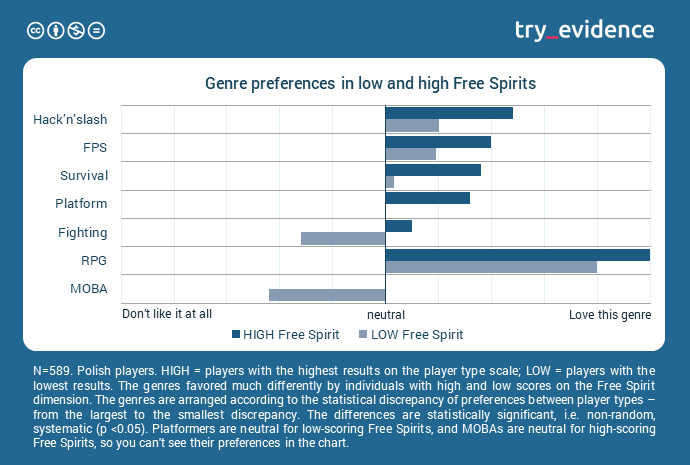
The Free Spirits are (moderately) “related” to Disruptors and more significantly related to Achievers. “Related,” is used here in the meaning: high scores on one type’s scale usually mean high scores on the other type’s scales.
Achiever
Achievers are motivated by skill improvement.
Such players appreciate a sense of development and love to unlock new skills.
Their favorite gaming activities include unlocking achievements and testing their skills in boss fights as well as other tough challenges.
Achievers will appreciate:
- challenges – both intellectual and manual,
- certificates, tokens confirming unlocked skills and achievements (Trophy/Achievement Hunters),
- opportunities to learn and improve skills (“skill mastery”),
- specific quests with clear goals,
- many levels, clear progression,
- boss fights which, once completed, are a confirmation of the acquired skill.
So far, all interrelationships have been confirmed except for the Achievers’ love of boss fights. Achievers appreciate various challenges, but don’t necessarily enjoy difficult fights. It also turned out that the elements desirable for this type of players are worth adding:
- badges and achievements,
Like Free Spirits, Achievers tend to exaggerate the qualities that society considers positive. Personally, they are the most conscientious (targeted) types of all. This means they can be not quite as “hardcore” as other player types. Theoretically, they would be more likely to use simulators, especially the more complex and actually realistic ones. They like FPS.
In our research among Polish players, the Conquerors preferred RPG, stealth and FPS more than other players. All these three genres undoubtedly provide intellectual and dexterity challenges, but most of all, they provide the player with many opportunities for improving competences.
Below I present the genres which Achievers prefer significantly less or significantly more than players demonstrating low levels of Achiever features.
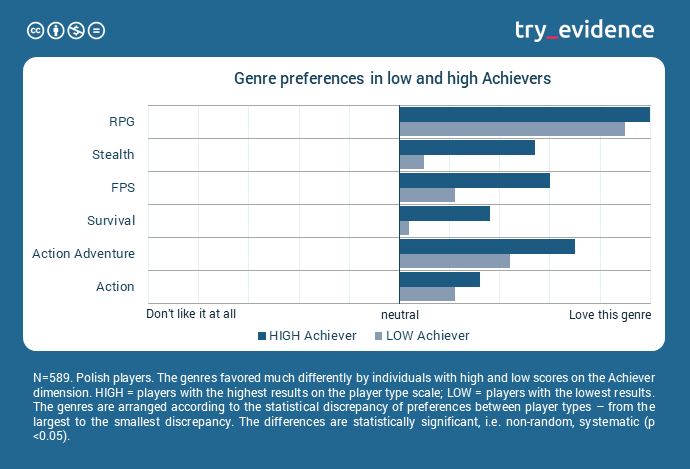
According to the UoW study, Achievers are (moderately) related to the Philanthropists and somewhat more closely related to Free Spirits. According to our research, the score on the Achiever scale also correlated – the most significantly – with the score on the Player scale.
Collector (Player)
Collectors are motivated by rewards. They will do whatever they can to win the prize – no matter what is required of them.
They love to receive points, items and badges.
They occupy the first places on scoreboards. In extreme cases, they do not want or do anything other than collecting rewards – points, badges, material achievements.
Collectors will appreciate:
- points and collecting “experience” (XP)
- all kinds of “physical” rewards
- rankings, comparisons, comparisons with other players,
- badges and achievements,
- virtual economy, in-game purchases,
- lotteries and random events such as lootboxes.
All these assumptions were confirmed in the UoW studies. In addition, Collectors were also found to be willing to belong to communities (for comparison, social challenges, community discovery). Collectors are also positively sensitive to almost all of the elements that satisfy Achievers. The only difference here is that Collectors do not have the constant urge to learn which is characteristic of Achievers.
Personally, the more one is a Collector, the more likely they are to be conscientious. Except for this one trait, this type of player can be associated with any personality.
Among the Polish players surveyed by Try Evidence, people who highly match the Collector type like survival, action adventure and fighting games much more than other players do. It is no surprise that they, more than the other player types (and as the only ones among all players), like racing games. Games of this type contain all the elements liked by Collectors. Collectors also have a lower dislike to sports games than others, also rich in rankings, points and stimulation with very specific prizes. Below I present the genres preferred by Collectors significantly less or significantly more than by players with minimal traits of this type.
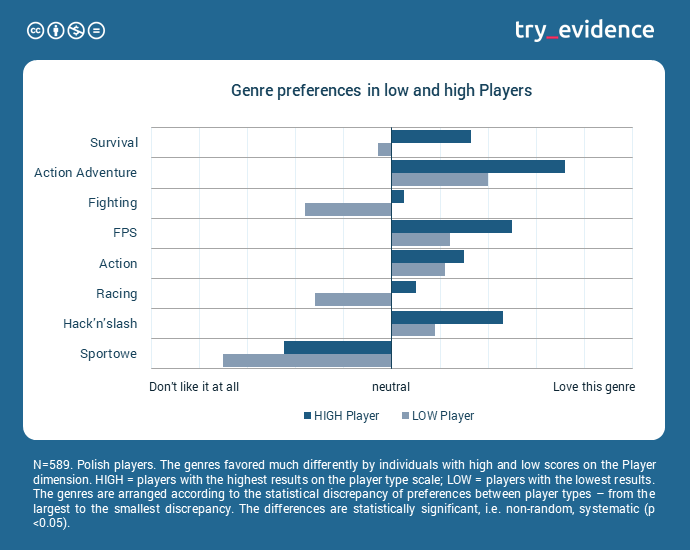
Collectors are significantly related to Achievers, moderately related to Socializers and Free Spirits, and the least related to Philanthropists.
Socializer
Socializers are motivated by relationships with people. These players want to interact with and bond with other players.
They like the feeling of belonging, competition and cooperation.
Whenever possible, they love to be part of a guild or team.
Socializers will appreciate:
- multiplayer
- guilds, teams, communities,
- visible expressions of social status,
- the ability to search for other players according to different characteristics, and be found,
- competition with other players.
All the above assumptions were positively verified. Additionally, the UoW study found that Socializers are willing to share knowledge with others, trade, and use various gifting mechanics.
In terms of personality, they are the most extroverted of all types of gamers.
They are also the most agreeable.
The remaining personality traits can be present in various proportions. We know from the research of Veronica Zammitto, the former director of UX research at Electronic Arts, that extraversion goes hand in hand with a liking for stimulating and violent games. This especially includes FPS, Action or Fighting games. Moreover, extroverts prefer sports games more than others. The research conducted by Try Evidence also found that the higher the player’s extraversion, the more likely they are to enjoy strategy games (both classic and RTS).
Among the Polish players surveyed by Try Evidence, people who highly match the Socializer type demonstrate higher preference for MOBA and MMORPG games than others – this is what distinguishes them the most from other players. They also like FPS and RTS games much more than other players (probably thanks to the multiplayer mode often found in these genres), sports games (probably due to competition, couch coop) and, what we found particularly surprising, survival games.
Below I present the genres preferred by Socializers significantly less or significantly more than by players with minimal traits of this type.
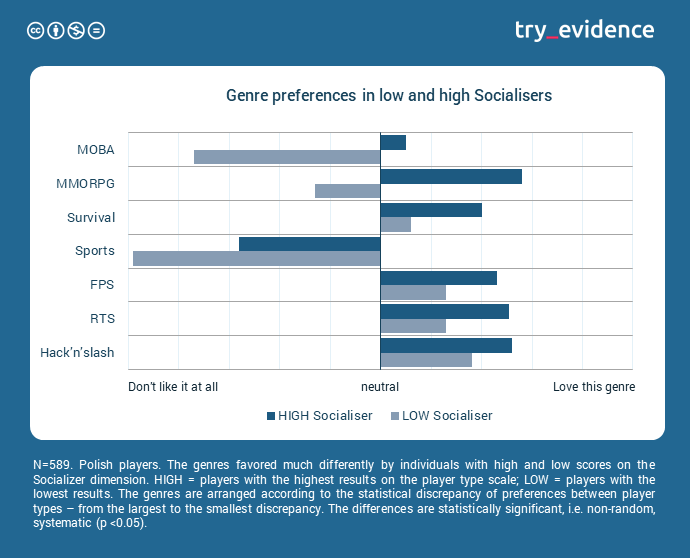
According to the UoW study, Socializers are most closely related to Players, slightly less related to Achievers and Free Spirits. They are definitely not related to Disruptor. According to our study conducted with Polish players, the Socializer is closely related only to the Player and Philanthropist (a high score on the Socializer scale usually coexists with a high score on the Player and Philanthropist scale).
Philanthropist
Theoretically, Philanthropists are motivated by “higher goals” and are great in administrative roles (e.g., in “playing god” games).
They are willing to share their knowledge and resources with other players.
They are altruistic and willing to share without expecting anything in return. As an example of ideal Philanthropists – outside the world of games – Marczewski cites the authors of Wikipedia. They are people who want to enrich world knowledge and help people without expecting anything material in return. Similar behavior can occur in games.
The author of the HEXAD typology claimed that the elements of games catering to this type of players are:
- a clear, important and, preferably, “socially” important goal,
- mechanics giving the feeling of being “someone better” or part of something bigger,
- the possibility of caring for and controlling other players or characters in the game,
- trade mechanics,
- mechanics of helping other players or sharing resources.
So far, however, there is no evidence that such dependencies are true (see UoW). It turned out that Philanthropists, like most types, enjoy challenges. The link between challenge and satisfaction is not as strong with them as with Free Spirits, Achievers or Players, but it is clearly there.
Personality-wise, this type of gamer is usually agreeable. Our research on the personality of players found that the more agreeable a player is, the more they prefer survival games.
The genre preferences of those who fit the Philanthropist type were no different than those of the other types of players.
Which genre for which type of player?
Almost every type of player in the HEXAD typology differs from the other types in the intensity of preference or dislike towards certain game genres. This differentiation results from the theory – the idea and description of Marczewski’s typology – and to a large extent it is also visible in the empirical data from the research of real players by Try Evidence.
Philanthropist was found to be the only completely undifferentiated type – players with high and low scores in this type did not differ in their genre preferences. In short, this appears to be a dimension unrelated to game choice, at least not with regard to the main genres.
The genres most “sensitive” to the differences between players are FPS, Action-Adventure, MMORPG and RPG. It is worth noting that RPG is a particularly broad genre and generally thus liked by the overwhelming majority of players in general. However, Free Spirits and Achievers prefer it the most.
The game genres which seem to be targeted at specific types, in line with theoretical predictions, were MMORPG and Platformers (low preference overall), as well as MOBA and Racing (which most players rather dislike).
The genre that is universally unpopular, but which has “fans” among Collectors and Socializers, were sports games.
The genres completely “insensitive” to differences between player types were classic adventure games, relatively highly preferred by all players (Life is Strange, What Remains of Edith Finch, Detroit: Become Human) and turn-based strategies (games like Civilization). Puzzle / Logic, Simulators (e.g. Euro Truck Simulator, Microsoft Flight Simulator and Car Mechanic Simulator), and city builders (Cities skylines, Tropico, the Anno series) were also insensitive.
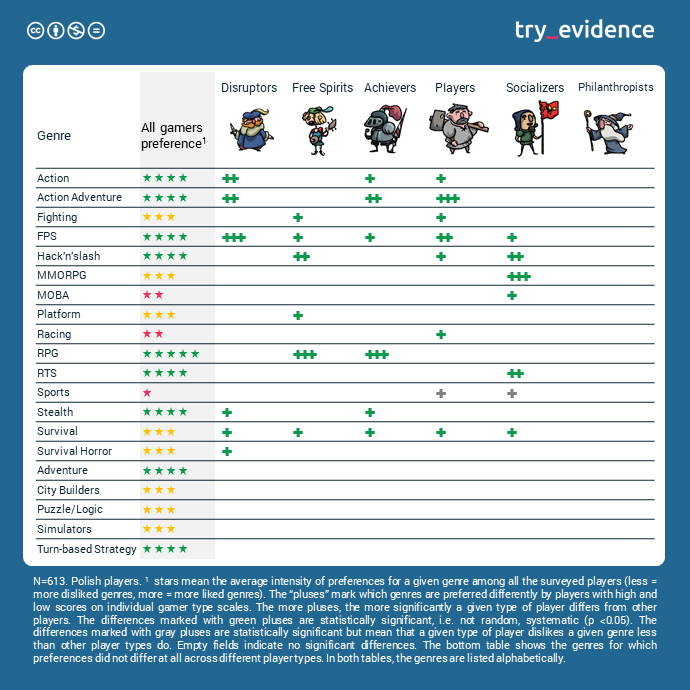
Practical conclusions
What are the practical conclusions, e.g. marketing insights for game developers and publishers, from the HEXAD typology and its empirical verification in our research?
Firstly: HEXAD seems to be a useful and rather intuitive player type framework. It is not a typical marketing segmentation. Instead, it is based on the psychological theory of motivation (self-determination theory) by Edward Deci and Richard Ryan. HEXAD is therefore well-grounded and practical.
Such a systematics can thus organize our thinking about the diverse motivations of different types of players
both in the process of designing, positioning and marketing of games.
Secondly: the presented empirical data from the research on HEXAD relationships and preferences of game genres conducted at Try Evidence shows that in the case of certain genres it is worth focusing on their specific, roughly defined recipients. For example, when designing a typical RPG like The Elder Scrolls, The Witcher or Divinity Original Sin for the Polish market, think first of all about Free Spirits and Achievers. They will probably be the first recipients of your game, even if RPG is a very popular and universally liked genre. The basic Polish recipients of your FPS will be Disruptors and Players. When making RTS for the Polish market, pay special attention to Socializers, etc.
At the same time, instead of thinking with player types in mind, it’s worth to consider their fundamental motivations,
broadly described by Marczewski.
Thirdly: if you are a gamer and you have your HEXAD score, you can easily see which themes are most likely to satisfy your needs as a gamer. What’s more,
you can check which genres are preferred especially by players with characteristics similar to yours.
Maybe you will discover new games that you haven’t paid attention to so far? You could also decide to finally play some of the games you have been reluctant to try?
*
Finally, I will emphasize the limitations regarding the interpretation of the presented data. The relationships between the HEXAD typology and game preferences presented here come from a sample of Polish players – mainly PC players or players who prefer the PC as a gaming platform. Performance and dependencies in other markets may vary. This is indicated, for example, by the visible differences in the relations between the specific types of players found in the British UoW research and in our Polish research. In addition, in our study, players rated preferences for multiple genres on after another on a scale from “absolutely dislike” to “love” and were able to show maximum preference or dislike to all genres at once.
We are currently working on the international verification of the results in several markets, including Asian. We are also testing a more nuanced approach to the favorite genres indicated by players, by distinguishing a total of 32 sub-genres. The third research subject is the verification of the preferences not towards specific genres, but towards specific game dynamics by players with different characteristics (you can read more about game dynamics in our report on player preferences). If you are investing in game development, or you are a developer or publisher and want to know more, feel free to contact us.
HEXAD research in Try Evidence – who were the surveyed players?
The research was conducted between July and September 2021. 589 players participated – 79% men, 16% women, and 4% identifying themselves in a different way. The players were aged between 16 and 67 years old and their average age was 22. They play on both consoles and PCs (see the graph below), but the favorite gaming platform for 82% of respondents was the PC.
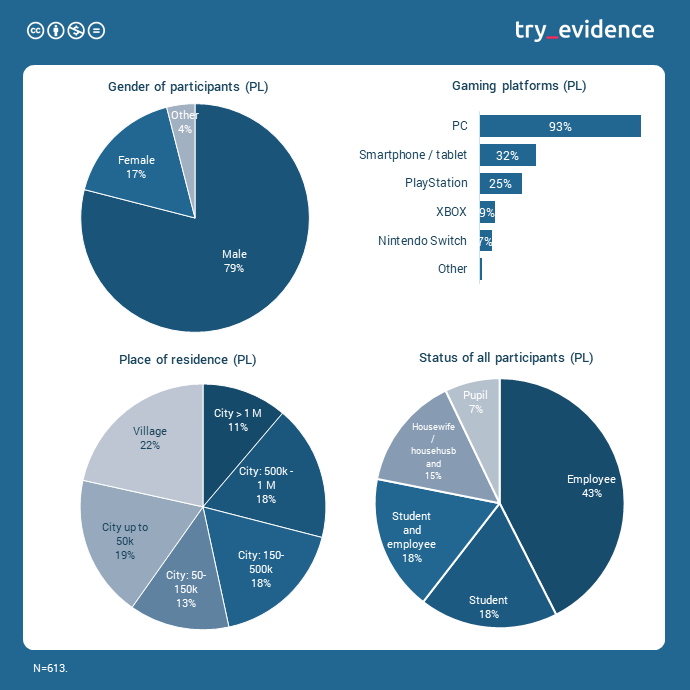
They were a group of players with above-average skills, as shown by the distribution of their preferred difficulty level (above-average preferred, see chart below). In the cross-sectional samples of players, the hard level is chosen by around 18%, and very hard by no more than 5%.
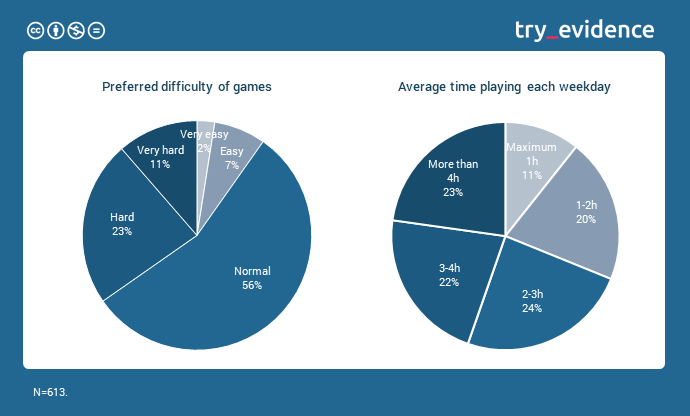
Despite their skill, the surveyed players did not spend more time playing games than average players. In cross-sectional trials, 33% of people spend 1-2 hours a day playing. Here, it’s 20%.





